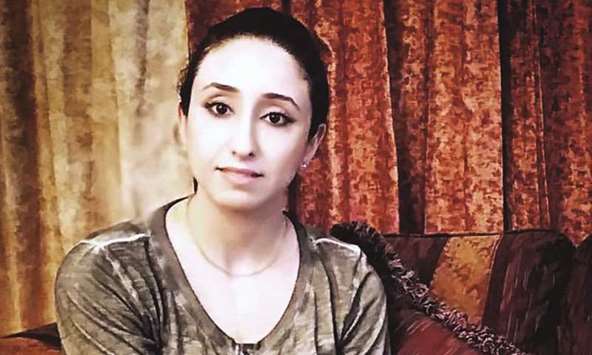The publisher of a Palestinian author denied a visa to appear at the Edinburgh book festival this year says that the Home Office has effectively stopped her from speaking, despite reversing its decision.
Nayrouz Qarmout, who is also a TV journalist, was one of a dozen Middle Eastern and African writers and illustrators who had their applications for visitor visas refused, sometimes multiple times, ahead of this year’s festival, which began on Saturday.
With all but three having received their visas, yesterday Qarmout was granted hers in a last-minute reprieve after applying three times since April.
A Home Office spokesperson said: “We have decided to issue a visa to Mrs Qarmout on the basis of new information that has been provided.
“We are working with her to ensure she receives her visa and travel documents as quickly as possible.”
However, it is unlikely Qarmout will make it in time for her scheduled appearance on Wednesday, when she was due to speak at a sold-out event about her book, The Sea Clock and Other Stories.
As a Gaza resident, she also requires approval from Jordan to fly from Amman to the UK, as well as an exit permit from Israel to pass through the Erez Crossing on the border.
She has been advised that it will take four to five days for her passport to arrive in Gaza.
The festival’s director, Nick Barley, said that a new event would be planned for 23 August in her honour.
“If she can attend, it will be a celebration of freedom of speech,” he said. “If not, we’ll bring attention to her case.”
Ra Page, the founder of Comma Press, Qarmout’s UK publisher, said: “Despite this last-minute reversal, the Home Office has effectively stopped Nayrouz from coming over, by not giving her the visa the last two times she applied, when there was still time.
“There’s no way she’ll be here on Wednesday, and it is not a guarantee that she’ll be here on the 23rd. Everything remains unknown and uncertain.”
Page said that he believed refusals were on the rise and that “internal directions have been issued to British consulates to reject more”.
“It feels like we’re all sleepwalking into a new age of nativism,” he said. “We’re not just talking about classic, difficult-to-prove institutional racism.
“We’re talking about quiet, effective cultural censorship.
“The Home Office is saying, in effect: British readers shouldn’t be hearing from other perspectives at our book festivals; their voices are of less worth; British voices first.”
Speaking before the decision, Qarmout said she had found the visa application process “intrusive” and that the reasons provided for her refusal – one Home Office letter listed her single status as a reason – were “humiliating”.
She attributed irregular payments in her bank statements to bureaucratic problems between the competing authorities in Ramallah and Gaza.
“I am supposed to explain myself in the context of the plight of all the Palestinians in order to apply for a visa? Even though I am travelling as a cultural ambassador of my people, it makes me uncomfortable ... I am not a terrorist and I am not a threat,” she said.
Two Iranian illustrators, Ehsan Abdollahi and Marjan Vafaeian, are still awaiting updates for their visas a month after applying.
Both have been informed by the Home Office that their applications had complications.
Both have been denied visas to attend the festival before, with Abdollahi – who was supposed to be the festival’s annual illustrator in residence this year – eventually having his 2017 refusal overturned after a high-profile campaign.
Delaram Ghanimifard, the co-founder of independent picture book publisher Tiny Owl, which publishes both Abdollahi and Vafaeian, said that she felt embarrassed about the increasing refusals.
“I know many Iranians applying to visit, some who are parents of British citizens, who are refused now. It is very difficult and it becomes more difficult each year.
“But when you have a publisher paying for everything, guaranteeing you will only stay a week and you’ve even done it before and returned home, yet you are still denied – this just shows how difficult the process is in general.”
Ghanimifard said she believed many foreign authors had already given up on attending UK festivals because of the hurdles.
“When you’re always under this stress applying for visas for your artists, you do start to feel there is no point,” she said. “I hope we can fight against it. But I can see what is happening ... I hope the overall situation changes, because this is embarrassing and it is nonsense.”

Qamrout: had been due to speak at a sold-out event on Wednesday.
